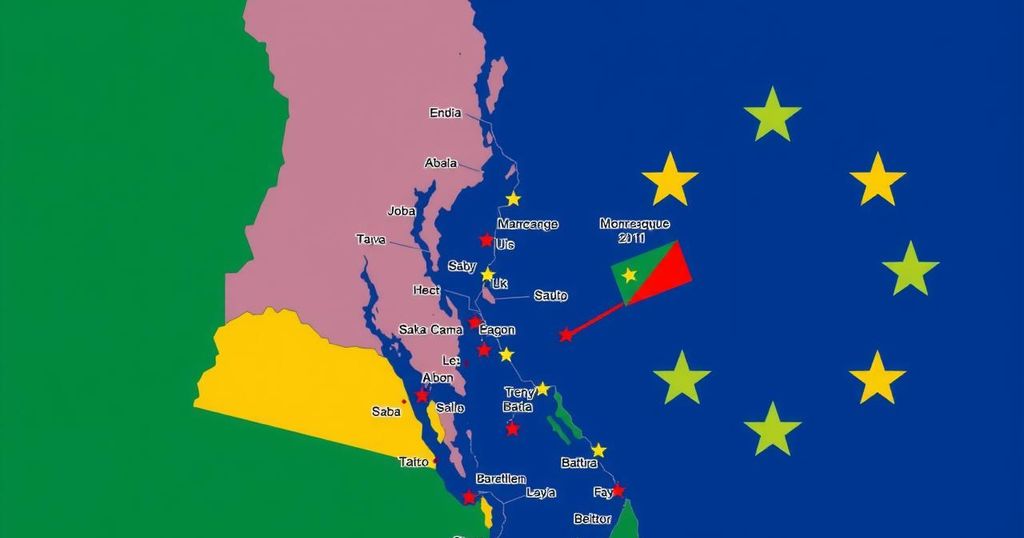EU Raises Alarm Over Potential Election Manipulation in Mozambique

The European Union has reported irregularities in Mozambique’s recent elections, claiming results have been doctored. Protests erupted following the assassination of two political figures associated with opposition candidate Venâncio Mondlane, who alleges government involvement. Amidst violence against demonstrators, the EU calls for transparency in election tabulation as pressure mounts for accountability from the authorities.
Election observers from the European Union (EU) reported that irregularities have been detected in the voting results of Mozambique’s recent elections, exacerbating unrest in the nation. Protests led by independent presidential candidate Venâncio Mondlane erupted following the alleged assassination of his lawyer, Elvino Dias, and another political official, Paulo Guambe, by security forces, which they deny. The EU observer mission claimed to have found evidence of discrepancies in the counting process and unjustified modifications of results at both polling stations and district levels. They have called upon the electoral authorities to ensure a transparent and credible tabulation process. Reports from the U.S.-based International Republican Institute document occurrences of vote-buying, inflated voter rolls, and intimidation tactics against voters, particularly in regions dominated by the ruling Frelimo party. The electoral commission’s website, responsible for publishing the national results since the election on October 9, was reportedly cyber-attacked last month, and it remains non-functional. Venâncio Mondlane, who is backed by the Podemos party, has asserted a premature victory and maintains that the killing of his associates was politically motivated, stating, “This was a crime committed by the defence and security forces. There’s no doubt about it.” In response to the violence, he has organized public demonstrations, during which police escalated their efforts to disperse the crowds using live ammunition, tear gas, and armored vehicles. Clashes ensued across cities such as Maputo, Beira, and Nampula, resulting in numerous injuries and arrests. Following the protests, businesses in the affected areas closed, only to partially resume operations shortly thereafter. Mondlane has scheduled additional protests in the coming days. There is increasing pressure on Mozambican authorities from international entities, including former President Armando Guebuza and the United Nations, to identify and apprehend those responsible for the killings. Renowned Mozambican author Mia Couto decried these events as a significant affront to the nation. Historically, Frelimo has maintained its grip on power since the country’s independence from Portugal, and with President Filipe Nyusi stepping down, the electoral landscape is poised for potential change with multiple candidates running for presidency, including Frelimo’s Daniel Chapo and other notable figures.
The current political climate in Mozambique is characterized by heightened tensions and allegations of electoral malpractice amidst the backdrop of a parliamentary election held on October 9, 2023. The Frelimo party, which has dominated the political scene since Mozambique’s independence in 1975, is under scrutiny as opposition figures accuse it of employing undemocratic tactics to secure its position. With allegations of violence against political opponents surfacing and the government’s failure to maintain transparency in the electoral process, the situation is increasingly precarious. The call for justice for violence committed against opposition members adds to the urgency of political reform in the wake of this election.
In summary, the European Union has raised serious concerns regarding the integrity of the recent elections in Mozambique, highlighting irregularities in the counting of votes and alleged manipulation of results. Protests protesting these injustices have sparked widespread unrest, marked by police brutality against demonstrators. The tragic killings of opposition members have amplified calls for accountability and justice, compelling both local and international actors to scrutinize the Mozambican government’s actions. As Mozambique approaches a transitional period in leadership, the demand for a fair electoral process remains critical, reflecting the citizens’ desire for genuine democratic governance.
Original Source: www.bbc.com








